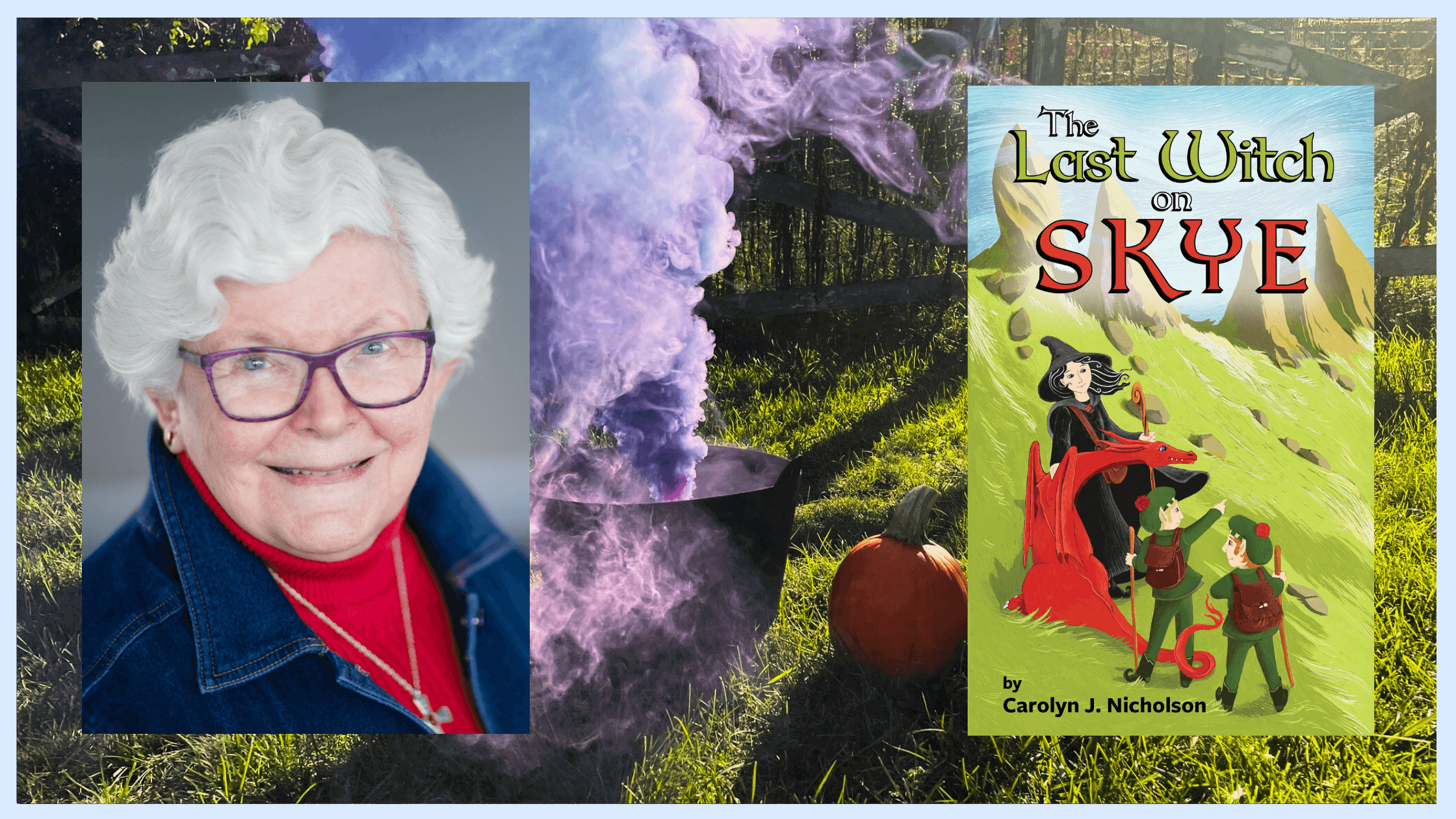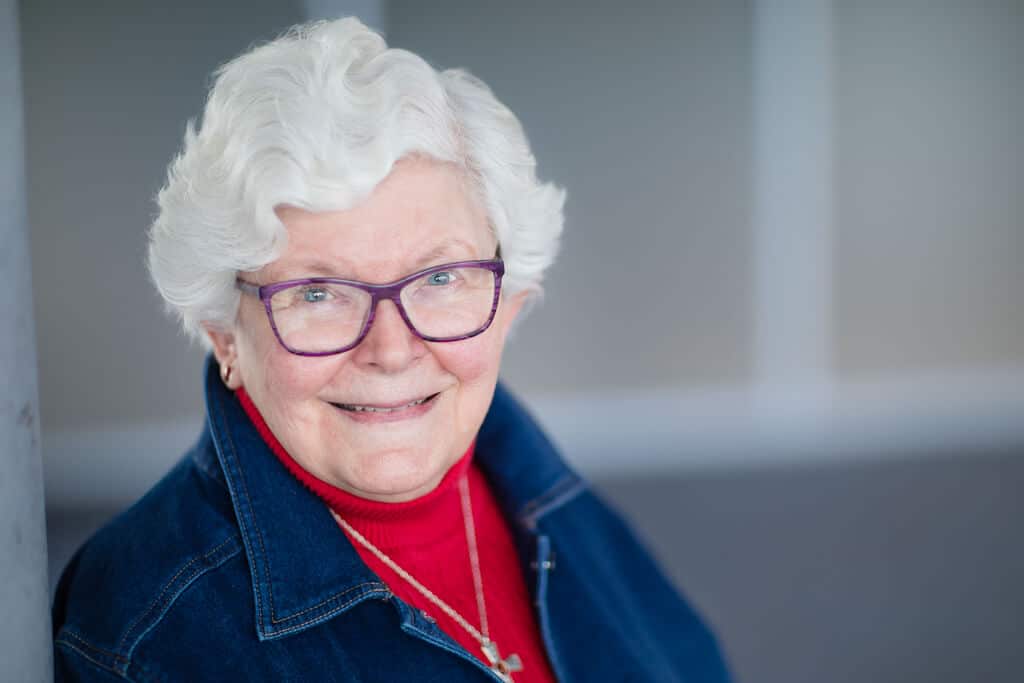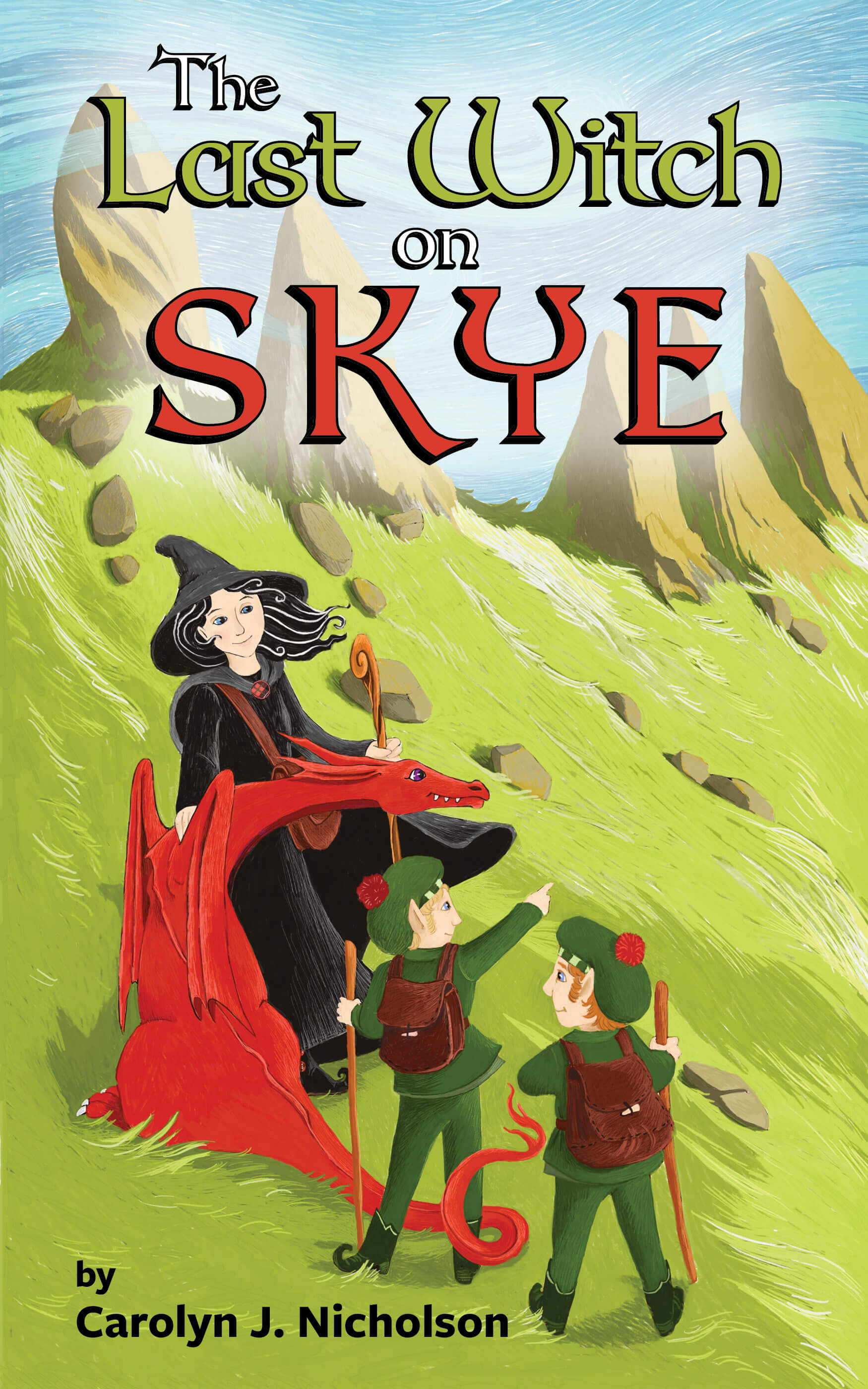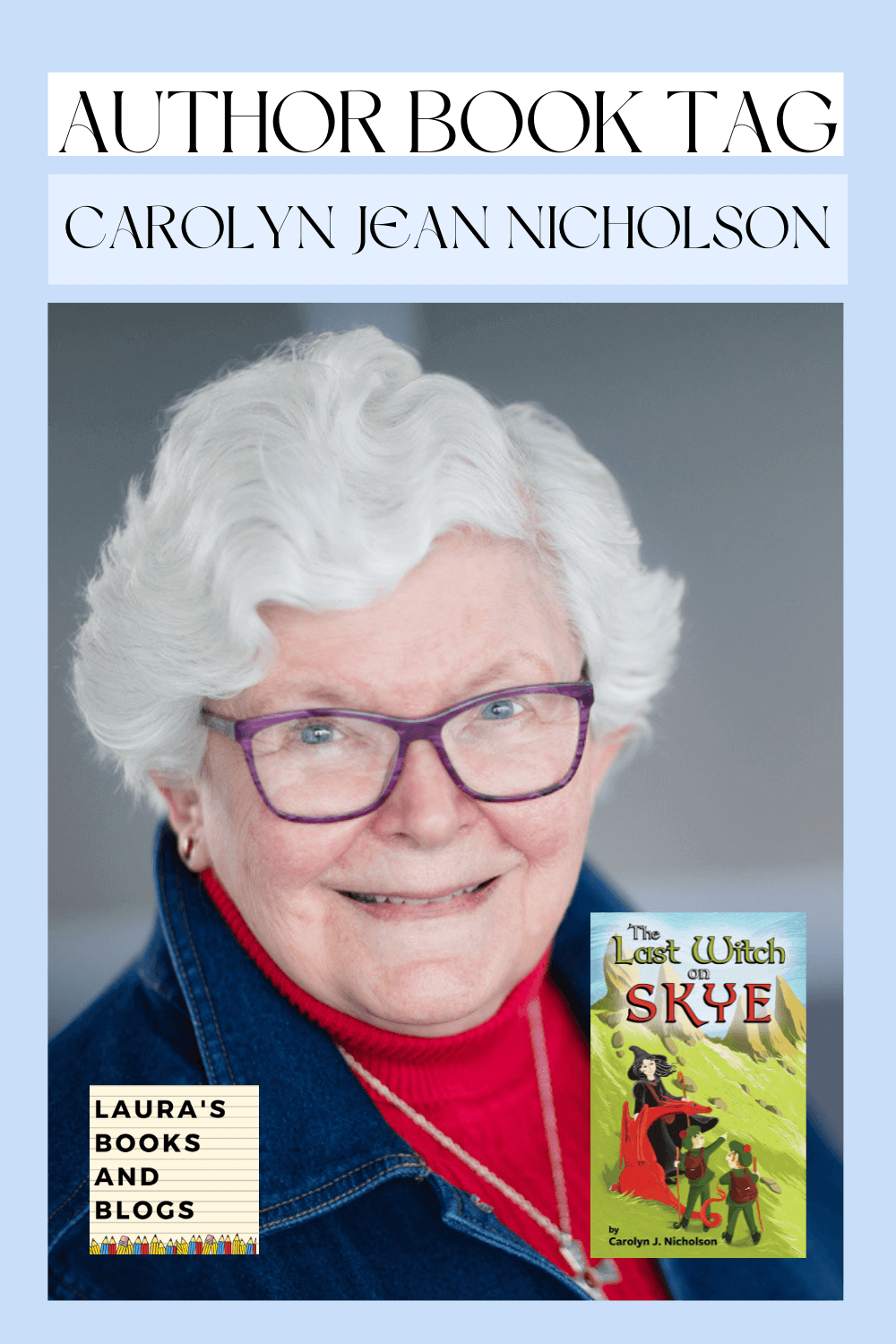
Carolyn was born in Bridgetown, Nova Scotia. She worked in the health information management field, taught in post-secondary education, and was in ministry in The United Church of Canada.
After her retirement, she began researching her ancestors. After many years she discovered her Nicolson ancestors were from the Isle of Skye in the Scottish Highlands, and she began to visit Skye with her sisters.
Skye, she learned, was always full of fairies, witches, water monsters, ghosts, and other supernatural creatures. As a project for her small writers’ group, she wrote a 1,200-word story about fairies, witches, etc., then decided to play some more with what she had written. In time, this became a larger and larger story.
Carolyn decided to take a course offered by the Writers’ Federation of Nova Scotia on how to write a children’s story. Then, daring to believe the story might be worth publishing, she contacted OC Publishing and the rest, as they say, is history.
Wishes sometimes do come true. And Carolyn’s wish would be that this little story might bring happiness and pleasure to children and that they might come to love little Magaidh and her friends and family as much as she does.
The Last Witch on Skye plot synopsis
The Ban the Witches and Fairies (BW&F) Party has chased all the supernatural beings out of the Isle of Skye. Only Magaidh, a young witch, remains, hiding in a castle disguised as a cat. But she and the Queen of the Fairies have a plan to rescue the Fairy Flag, allowing the fairies and Magaidh to return to Skye.
As Magaidh resumes her business, Spells, Inc., she thinks about getting revenge on the BW&F Party, but the Fairy Queen suggests that peace would be a better plan. While Magaidh considers which it will be, peace or revenge, her business allows her to help the people of Skye with love potions and spells to reverse the troublesome effects of fairy arrows. She and her two fairy friends, Sean and Iain, go on many adventures together, including rescuing a baby Welsh dragon, dealing with Big Blue Donald, a ghost, and befriending a baby water horse. In the process, Magaidh gets to know her father and finds out why she is different from her siblings, who force her to choose revenge!
An interview with Carolyn Jean Nicholson

Why do you write in the genre that you do?
This is my first children’s story, but it has a historical background and for the most part I write historical fiction based on research about my own ancestors. If I had enough information about any one of my ancestors, I might try biography or creative non-fiction.
Do you keep a notebook of ideas?
No, I do research and keep masses of both specific and general information which I use as both inspiration and background for my stories.
Do you have a muse?
Yes, Mary Stewart and her classic Merlin trilogy. Mary was one of the most popular novelists in her day. She was born in County Durham, England and lived in the West Highlands of Scotland.
Her first novel in the series, The Crystal Cave, became a bestseller on both sides of the Atlantic. I remember reading it as a young person and was totally enthralled by it.
When I started writing my children’s story, I ordered all three books in the trilogy and read them again with just as much pleasure. You no sooner begin her story than you are there – in 5th century Britain – following the life of Merlin as he tells his own story.
The level of detail about the natural world is enviable. You hear the trees moving, see the moon rising, experience the interior of the cave, feel the waves lifting the boat.
Are you more of a fan of plot-driven stories or character-driven stories?
Character-driven stories best suit my interest in the people of the past. There has to be a narrative arc, of course, but I wouldn’t call it a plot.
Fill in the blank: “People will like your book if they like stories about…”
People will like my children’s book if they like stories about magic and supernatural creatures. Magaidh, a young witch – or is she really a witch? – and her fairy friends have many memorable adventures as she discovers her true identity and her true home.
What are your thoughts on typewriters?
Funny question! I once owned an electric typewriter. It seemed so modern until computers showed up.
Typewriters don’t allow you to make corrections easily, and don’t even ask about making corrections when you have two or three copies with a piece of carbon paper between each. Photocopiers were a big help, but in the end, having Microsoft Word and being able to send the document to a printer is the best.
Would you rather own a bookstore or run a library?
I think that owning a bookstore would allow you to be more creative, but you would have to have a good business head for sure. Most libraries are government owned and operated so less risky financially but less opportunity to be creative, I would think. Having never done either, these are just my casual thoughts.
How do you name your characters? If you write nonfiction, do you ever change the names of your characters, and if so, how do you decide what names to change them to?
My children’s story is set in the Isle of Skye, Scotland, so the characters all have Gaelic names. When I write about my ancestors, I use their names but sometimes have to create a minor character. Then, I research the names of the people who were present in that time in history.
In the past, many cultures had naming patterns. For example, the oldest son was named after his paternal grandfather and the second son was named after his maternal grandfather. The oldest daughter was named after her maternal grandmother and the second daughter after her paternal grandmother. After that, the names were all from past relatives.
My 6th great grandfather had seven sons. All the names were from the past two generations.
What is your favorite website that you use to promote your writing?
My children’s story is promoted on the OC Publishing website.
If Hollywood bought the rights to your book, would you want it to be turned into a movie or series?
I haven’t allowed myself to even dream about that, but with my children’s book I think it would be best as a movie – although I already have desire to write a sequel to the book.
Who is your dream audiobook narrator?
I don’t know any narrators. Perhaps I should look into this.
How many words or pages do you typically write in one writing session?
Hard to say. I’m pretty relentless once I decide to write a book. I guess it depends on what scene I’ve worked out in my head.
Once I’ve a sense of what needs to be next to move the narrative along and have worked out the scene in my head, then I go to the computer and type it up – just to get it on paper. Then, I watch the scene play over in my head and see if it makes sense.
Even when I’m not actually sitting at the computer typing, I’m still working on the book. It may take me 500 or a thousand words to put a scene on paper.
Do you have any writing rituals?
Yes. I do copious amounts of research and reading over my research before I ever begin to write. Then I sit on my bed and work out a scene in my head.
I seldom begin to type unless the whole day stretches out before me without any known interruptions. I’m not a multi-tasker. I have to be in my imagination and stay in my imagination without interruptions.
As much as possible, I try to inhabit my main character – and sometimes other characters. As I’m writing dialogue, I’m speaking and feeling the emotions, etc. I often go back and read whole sections of the book just to get the feel of it and to see if everything is flowing. That’s just a few of my rituals when writing. I’m sure there are more.
What are your passions/obsessions outside of writing?
I love doing research, especially ancestor research. I might not be able to tell you what I had for supper yesterday, but I can tell you, for instance, all the eleven generations of my Morton ancestors since they came to North America in 1623.
Once I know about some ancestors, then I want to go and visit where they’re from including where they’re buried. I love to go to museums and archives in the areas my ancestors are from.
I love to go to Scotland, especially the Isle of Skye – where I’m going in September to attend the International Gathering of the Clan MacNeacail (Nicolson)

Have you made any public appearances to promote your book?
My first book came out during Covid, and my contract indicated I had to do a book launch. So, I booked a site, called Family and Friends, had the museum advertise on their website, and gave a talk about the book and sold quite a few copies.
I also had an organization let me give a talk to their Zoom audience – again, this was during Covid. I went to bookstores, museums, etc. I didn’t really know what I was doing but I kept doing everything that I could. I am very happy that OC Publishing does know what they’re doing to promote my children’s book.
Who would you most want to read your book?
I would love for all children of the appropriate age to read my book. Since it’s in English, I guess that would limit the possibilities but I’m hoping to have it translated in Gaelic to be of benefit to those Gaelic speakers and learners in Nova Scotia and Scotland.
Who is on your Mt. Rushmore of greatest/inspirational authors?
I’ve already mentioned Mary Steward. Another would be C. S. Lewis, author of The Lion, the Witch, and the Wardrobe, and several other children’s books. J. K. Rowling and the Harry Potter series comes to mind. Kelly Barnhill wrote an interesting novel, The Girl Who Drank the Moon. Just recently, I read Laura Best’s middle-grade novel, This is it, Lark Harnish.
Is there a book that somebody gave to you that helped you pave the way to becoming a writer, or is there a book on writing that you recommend all writers read?
I’ve used Save the Cat! Write a Novel – The Last Book on Novel Writing You’ll Ever Need by Jessica Brody.
I also have used The Great Courses DVD How to Write Best-Selling Fiction by James Scott Bell.
Have you ever mentored another writer with their writing?
Well, I tried. My sister decided to write a novel. It is now in three volumes, or maybe more for all I know. I have suggested she read the references above and have bought her for her birthday several courses both from the Writers’ Federation of Nova Scotia and OC Publishing.
Perhaps this is more ‘supporting’ rather than ‘mentoring’ as I have never seen her manuscript – well, I did see a page or two and didn’t give her the reviews she wanted, so I’ve never seen it since. Probably for the best. Sisters probably are too close to critique the other’s work.
Is there an idea that a non-writer has pitched to you that you have considered writing?
The illustrator for my children’s book suggested I should write a sequel, but perhaps she just enjoyed illustrating the children’s story. But, still, it did make me think about the possibility.
Do you ever use dreams as inspiration for your writing?
This is my favorite question. Yes. I don’t remember my dreams on a regular basis but when I do, they’re unforgettable and I use them in my writing.
For example, when Isabel’s husband dies, she prays to see him just once more; she wants to know if he’s happy. How can she go on with her life without knowing if he’s happy. Then she sees him in a dream that is entirely based on a dream I had when my husband died.
Are you a big reader? Do you own a large collection of books, or are you more of a borrower?
I used to own bookshelves full of books but have had to downsize several times. However, just down the hall from my condo is the library which is very full of books.
I used to be a voracious reader but when my eyesight failed one of my great pleasures was gone. It was all I could do to continue on with my research.
Have you ever gone away to work on a piece of writing? If not, where would you go if you could?
I have often gone away to do research for a book, but I would not go to write as I would not have all my research or as much control of my environment as I would at home.
What is an annoying thing that a non-writer has assumed about writers or the act of writing?
Well, once I was that non-writer, so I know exactly what non-writers assume. I had done a lot of research and was looking at the great pile of paper in many binders and wondering what I was going to do to make it useful to others.
Then I had the brilliant idea: why not write a book? I could read books so how hard would it be to write one? I know the answer to that question now! People do assume that the whole story just comes out of your head as a “whole cloth” and so you just need to write it down.
Most people have an idea of a story in their mind which they always intend to write. I got some good advice – forget where – sit down and write 90 pages. If you can write at least 90 pages, then perhaps you have the idea and the stamina to write a book.
I tried that and was rather horrified at how soon my story ‘ran out’ – long before 90 pages. But I was determined, so I started to research how to write a book and follow the ideas until I had something of the semblance of a whole story. It was a fairly painful process, but I don’t usually give up once I make up my mind.
How do you measure the success of your writing career?
What a good question. Wish I knew the answer. I have never had the idea I was going to make a lot of money, maybe not even a little money. I had some stories I wanted to tell, and I hoped people would enjoy them. That would be very satisfying to me.
Of course, I would like to make a little money because I don’t have a lot of money but if I didn’t, that wouldn’t be how I measured my success. With my children’s book, I have this dream of children reading about Magaidh, her friends and family, and being engrossed in the story and truly enjoying it the way I did with Mary Stewart’s Merlin trilogy. Decades and decades later that is what I went back to for joy of reading and inspiration.
Buy it!
Barnes & Noble
Pin it!



